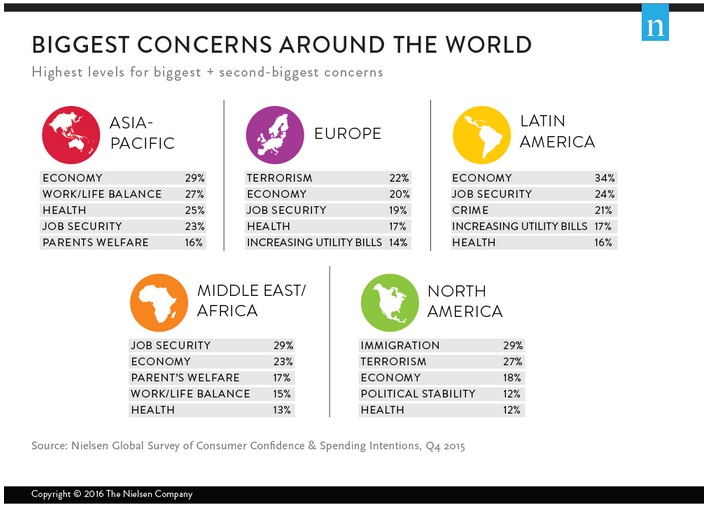 What keeps you up at night? There’s probably more than just one thing: From anxieties about rising utility bills to worries about our personal health, to concerns about the wellbeing of our family, there’s a lot to think about.
What keeps you up at night? There’s probably more than just one thing: From anxieties about rising utility bills to worries about our personal health, to concerns about the wellbeing of our family, there’s a lot to think about.
In Nielsen’s fourth-quarter consumer confidence survey, fears about terrorism escalated to new highs in North America (27%) and Europe (22%), trumping the economy as the biggest concern in both regions. In the U.S., 29% of online respondents said terrorism was their biggest or second-biggest concern, an increase of 15 percentage points from the third quarter. In Europe, concern levels were also high and grew significantly from the third to the fourth quarter in Israel (43%, +24pp), the U.K. (32%, +11pp) and the Netherlands (26%, +8pp). Levels were very high or high and remained relatively stable quarter-on-quarter in Turkey (56%, -2pp), France (25%, -1pp), Czech Republic (24%, +1pp), Switzerland (23%, +1pp) and Germany (23%, no change).
Immigration concerns also escalated in North America (29%), as just under one-third of Americans (32%) said it was their biggest or second-biggest worry, a rise of 26 percentage points from the third quarter making it the number one concern in the country. Immigration anxieties were also notably high in central European and Scandinavian countries, with levels highest in the Czech Republic (36%), Sweden (28%), Germany (27%), Austria and Norway (26% each), the U.K. and Switzerland (22% each) and Finland (21%)—most with significant quarter-on-quarter increases.
In most economies and over most periods in the survey, concerns related to the economy, jobs and prices have been top-of-mind for consumers. That terrorism and immigration should remain important or increase across several major consumer markets is a new phenomenon.
“Consumer concerns about terrorism and immigration have risen in recent quarters in those countries most affected by recent related events,” said Louise Keely, senior vice president, Nielsen, and president, The Demand Institute. “We continue to monitor the effects that these demographic and political issues may eventually have on consumer spending. In general, it is big and unexpected events that are likely to be the most disruptive for consumers.”
The economy remained the top concern in Latin America (34%) and Asia-Pacific (29%), with levels highest globally in Venezuela (54%), Thailand (51%), Malaysia (50%), Taiwan (44%), Indonesia (42%) and Argentina (39%).
Job security concerns were highest in the Middle East/Africa (29%), as four-in-10 respondents in the United Arab Emirates (40%), one-in-three in Pakistan (33%) and almost three-in-10 in Egypt (29%) said it was their biggest or second-biggest concern.



